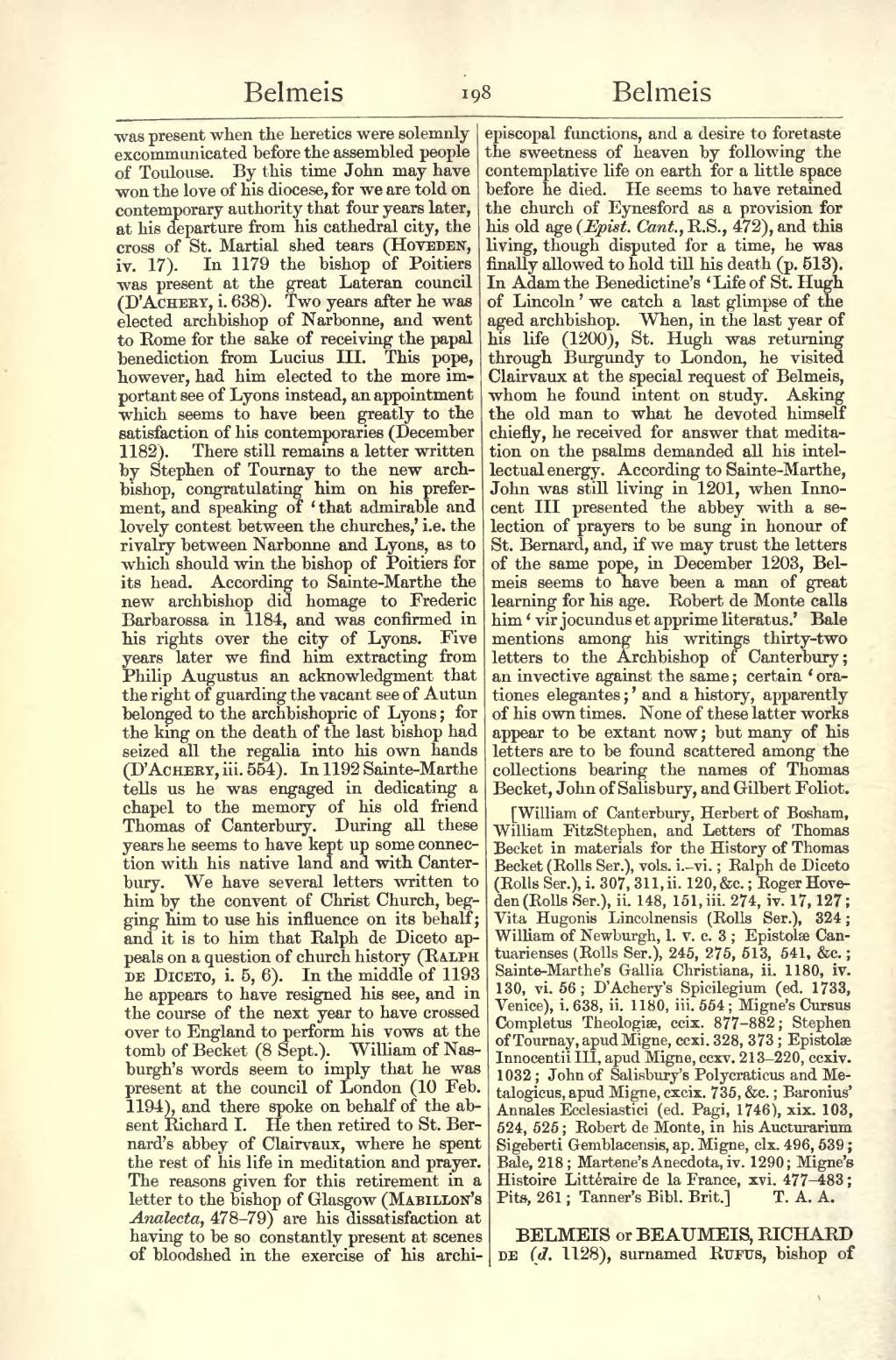was present when the heretics were solemnly excommunicated before the assembled people of Toulouse. By this time John may have won the love of his diocese, for we are told on contemporary authority that four years later, at his departure from his cathedral city, the cross of St. Martial shed tears (Hoveden, iv. 17). In 1179 the bishop of Poitiers was present at the great Lateran council (D'Achery, i. 638). Two years after he was elected archbishop of Narbonne, and went to Rome for the sake of receiving the papal benediction from Lucius III. This pope, however, had him elected to the more important see of Lyons instead, an appointment which seems to have been greatly to the satisfaction of his contemporaries (December 1182). There still remains a letter written by Stephen of Tournay to the new archbishop, congratulating him on his preferment, and speaking of 'that admirable and lovely contest between the churches,' i.e. the rivalry between Narbonne and Lyons, as to which should win the bishop of Poitiers for its head. According to Sainte-Marthe the new archbishop did homage to Frederic Barbarossa in 1184, and was confirmed in his rights over the city of Lyons. Five years later we find him extracting from Philip Augustus an acknowledgment that the right of guarding the vacant see of Autun belonged to the archbishopric of Lyons ; for the king on the death of the last bishop had seized all the regalia into his own hands (D'Achery, iii. 554). In 1192 Sainte-Marthe tells us he was engaged in dedicating a chapel to the memory of his old friend Thomas of Canterbury. During all these years he seems to have kept up some connection with his native land and with Canterbury. We have several letters written to him by the convent of Christ Church, begging him to use his influence on its behalf; and it is to him that Ralph de Diceto appeals on a question of church history (Ralph de Diceto, i. 5, 6). In the middle of 1193 he appears to have resigned his see, and in the course of the next year to have crossed over to England to perform his vows at the tomb of Becket (8 Sept.). William of Nasburgh's words seem to imply that he was present at the council of London (10 Feb. 1194), and there sjX)ke on behalf of the absent Richard I. He then retired to St. Bernard's abbey of Clairvaux, where he spent the rest of his life in meditation and prayer. The reasons given for this retirement in a letter to the bishop of Glasgow (Mabillon's Analecta, 478-79) are his dissatisfaction at having to be so constantly present at scenes of bloodshed in the exercise of his archiepiscopal functions, and a desire to foretaste the sweetness of heaven by following the contemplative life on earth for a little space before he died. He seems to have retained the church of Eynesford as a provision for his old age (Epist. Cant., R.S., 472), and this living, though disputed for a time, he was finally allowed to hold till his death (p. 513). In Adam the Benedictine's 'Life of St. Hugh of Lincoln' we catch a last glimpse of the aged archbishop. When, in the last year of his life (1200), St. Hugh was returning through Burgundy to London, he visited Clairvaux at the special request of Belmeis, whom he found intent on study. Asking the old man to what he devoted himself chiefly, he received for answer that meditation on the psalms demanded all his intellectual energy. According to Sainte-Marthe, John was still living in 1201, when Innocent III presented the abbey with a selection of prayers to be sung in honour of St. Benard, and, if we may trust the letters of the same pope, in December 1203, Belmeis seems to have been a man of great learning for his age. Robert de Monte calls him 'vir jocundus et apprime literatus.' Bale mentions among his writings thirty-two letters to the Archbishop of Canterbury ; an invective against the saime ; certain 'orationes elegantes;' and a history, apparently of his own times. None of these latter works appear to be extant now ; but many of his letters are to be found scattered among the collections bearing the names of Thomas Becket, John of Salisbury, and Gilbert Foliot.
[William of Canterbury, Herbert of Bosham, William FitzStephen, and Letters of Thomas Becket in materials for the History of Thomas Becket (Rolls Ser.), vols, i.-vi. ; Ralph de Diceto (Rolls Ser.), i. 307, 31 1, ii. 120, &c. ; Roger Hoveden (Rolls Ser.), ii. 148, 151, iii. 274, iv. 17, 127; Vita Hugonis Lincolnensis (Rolls Ser.), 324 ; William of Newburgh, l. v. c. 3 ; Epistolæ Cantuarienses (Rolls Ser.), 245, 275, 513, 541. &c. ; Sainte-Marthe's Gallia Christiana, ii. 1180, iv. 130, vi. 56 ; D'Achery's Spicilegium (ed. 1733, Venice), i.638, ii. 1180, iii. 554; Migne's Cursus Completus Theologiæ, ccix. 877-882; Stephen of Tournay, apiul Migue, ccxi. 328, 373 ; Epistolæ Innocentii III, apud Migne, ccxv. 213-220, ccxiv. 1032 ; John of Salisbury's Polycraticus and Metalogicus, apud Migne, cxcix. 735. &c. ; Baronius' Annales Ecclesiastici (ed. Pagi, 1746), xix. 103, 524, 525 ; Robert de Monte, in his Aucturarium Sigeberti Gemblacensis, ap. Migne, clx. 496, 539 ; Bale, 218 ; Martene's Anecdota, iv. 1290; Migne's Histoire Littéraire de la France, xvi. 477-483 ; Pits, 261 ; Tanner's Bibl. Brit.]
BELMEIS or BEAUMEIS, RICHARD
de (fl. 1128), surnamed Rufus, bishop of
